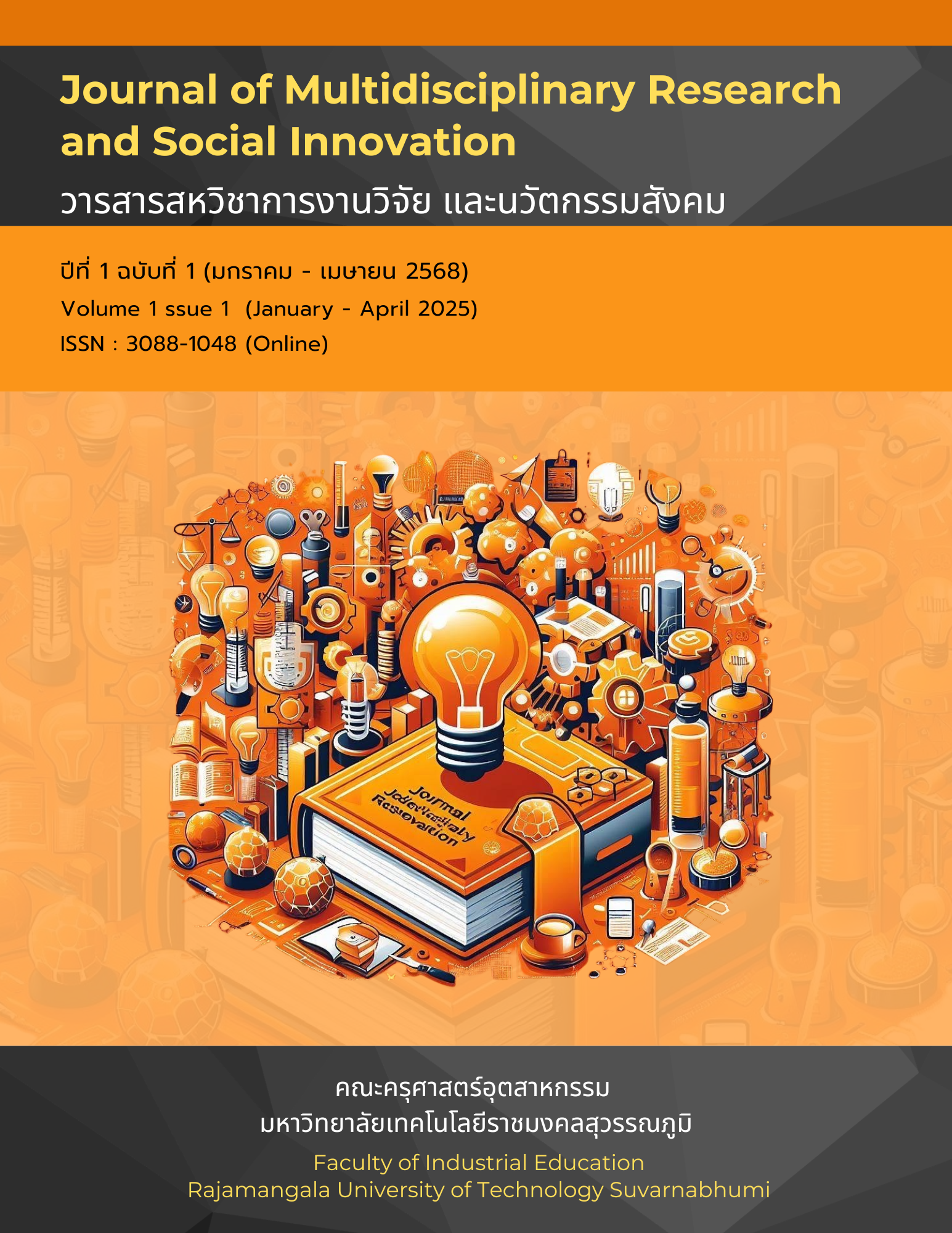Guidelines for Developing Ethical Technology Skills for Learning of Mechanical Engineering Students at Faculty of Engineering and Architecture Rajamangala University of Technology Suvarnabhumi
Main Article Content
Abstract
This research aimed to study the level and guidelines for developing ethical technology skills for learning of mechanical engineering students. The sample group used in this research consisted of 136 students in the Bachelor of Engineering program in mechanical engineering, faculty of engineering and architecture, Rajamangala University of Technology Suvarnabhumi, academic year 2024. The sample size was determined according to the Krejcie and Morgan table by simple random sampling. The research instrument was a questionnaire in the form of a rating scale with an IOC value of 1.00 and a reliability value of 0.95 and the discrimination power (r) was between 0.45 - 0.75. The statistics used in the research were percentage, mean, and standard deviation.
The findings revealed that 1) the level of ethical technology skills for learning of mechanical engineering students was at a high level, when considering each aspect, it was found that all aspects were at a high level ranked from highest to lowest mean as follows: ethical use of technology, ability to understand and respect the perspectives, thoughts and feelings of others, generosity when online users have problems, knowledge and understanding of laws related to computers, knowledge of copyright and respect for other of intellectual property and rights and, freedoms, and actions in the digital society, 2) the results of the synthesis of ethical technology skills for learning of mechanical engineering students were as follows: (1) role-playing is an embedded in knowledge-enhancing activities and presented as group discussions, (2) fake news detection is a competition to propose ideas, developments and approaches to managing fake news and, (3) a workshop on media literacy, with experts from cyber law and security invited to share their knowledge
Article Details
References
กัญฐณา สุขแก้ว. (2562). ประเด็นทางสังคมและจริยธรรมในการใช้เทคโนโลยีสารสนเทศของนักศึกษา สาขาระบบสารสนเทศ คณะบริหารธุรกิจ มหาวิทยาลัยเทคโนโลยีราชมงคลศรีวิชัย. วารสารครุศาสตร์ มหาวิทยาลัยราชภัฏสกลนคร, 1(1), 74-83
จิราศักดิ์ นนทะแก้ว. (2565). การส่งเสริมจริยธรรมด้านการใช้เทคโนโลยีสารสนเทศให้กับนักเรียนนายสิบตำรวจ. วารสารครุศาสตร์ปริทรรศน์ฯ,9(1), 460-470.
ถวิล อรัญเวศ. (2566). จริยธรรมในการใช้เทคโนโลยีสารสนเทศและการสื่อสาร (ICT). จาก https://www.gotoknow.org/posts/687074 [10/1/2568].
ณฤทธิ์ จึงสมาน . (2566). ทักษะความเป็นพลเมืองดิจิทัลสำหรับนักศึกษาในศตวรรษที่ 21. วารสารมหาจุฬานาครทรรศน์, 10(12), 197-208.
บุญชม ศรีสะอาด. (2553). การวิจัยเบื้องต้น. พิมพ์ครั้งที่ 8. กรุงเทพฯ : สุวีริยาสาส์น
พิเชษฐ รุ้งลาวัลย์. (2550). การศึกษาความต้องการด้านคุณธรรมจริยธรรมสาหรับ หลักสูตรด้านคอมพิวเตอร์ในระดับอุดมศึกษา. วิทยานิพนธ์ สาขาเทคโนโลยีคอมพิวเตอร์ มหาวิทยาลัยเทคโนโลยีพระจอมเกล้าพระนคร เหนือ.
รัตน์ชนก พราหมณ์ศิริ. (2564). การใช้เทคโนโลยีกับการจัดการศึกษาของนักศึกษาระดับอุดมศึกษาในจังหวัดพิษณุโลก.วารสารวิจัยทางการศึกษา, 16(1) 27-38
รัตนาวดี เที่ยงตรง. (2564). การศึกษาการใช้เทคโนโลยีดิจิทัลเพื่อการจัดการเรียนรู้ของครูในสถานศึกษา สังกัด สำนักงานเขตพื้นที่การศึกษาประถมศึกษาสุโขทัย เขต 2. การศึกษามหาบัณฑิต สาขาวิชาการบริหารการศึกษา มหาวิทยาลัยนเรศวร
สุภิญญา กลางณรงค์ และณภัทร เรืองนภากุล. (2565). ความเป็นพลเมืองยุคดิจิทัลกับการรับมือด้านมืดออนไลน์ในวิถีปรกติใหม่. จาก https://blog.cofact.org/digitalcitizen/[ 20/11/2567].
นิกร โภคอุดม และ กัญจน์ณิชา โภคอุดม. (2565). การรับรู้ข่าวสารในยุคดิจิทัล. วารสารวิชาการมหาวิทยาลัยอีสเทิร์นเอเชีย ฉบับสังคมศาสตร์และมนุษยศาสตร์, 12(1), 60-69.
Ezeji, C. L. (2024). Emerging technologies and cyber-crime: strategies for mitigating cyber-crime and misinformation on social medianand cyber systems. International Journal of Business Ecosystem and Strategy (2687-2293), 6(4), 271-284.
Positioningmag. (2563). When the ‘New Normal’ lifestyle is increasingly creating ‘inequality’ for those who cannot access the internet. From https://positioningmag.com/1306152 [20/1/2568].


